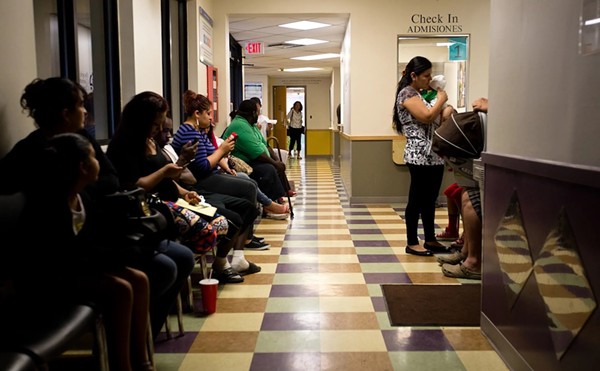In a country whose economy is experiencing the worst crisis since the Great Depression, San Antonio’s got the dubious luck of being a poor city already: Our average median family income scrapes along at about two-thirds the national benchmark. Roughly a quarter of Bexar County’s children live under the poverty line, yet we consider ourselves lucky. The Economy, that great godlike abstraction, has less capital to mess with down here, or so says conventional wisdom; the effects of the great tanker run aground are felt last by those who had nothing on the ship-coming-in to begin with.
San Antonio, though, in addition to (and sometimes because of) our poverty, is engaged in a vast and diverse “shadow economy,” a bajillion financial transactions by countless folks whose necessities are paid for through means not accounted for by the GNP, not measured in the Dow Jones, and usually not registered with the IRS. Statistics for this shadow economy are, well, shadowy, involving as it does barely understood labor performed by sometimes-undocumented people with no written record of it ever happening.
But it’s happening. Chances are, you know one of the shadow economy’s participants, whether or not you number among the working poor. Your neighbor’s cleaning lady, for instance, may not get a W-2. Maybe you’ve purchased a roll of samizdat Hannah Montana stickers at a flea market, or a handmade Sponge Bob piñata at a (likely not-City-licensed) yard sale. Or consider the Wild West marketplace of Internet commerce, whose convoluted backways are signposted by Nigerian scam emails addressing you as Beloved. Or perhaps you’ve paid cash for sex, or drugs, or have been, yourself, paid with one or the other.
And maybe you wonder how the financial practices of the poor and/or creative are affected by Great Depression 2.0. Are there economic sectors which, to paraphrase Tony Soprano, are so clandestine, or so compulsive to the flawed human animal, as to be recession-proof?
So with all that in mind, I took to the streets and to the world wide web and to Westside bungalows and Northside apartments to do some highly unscientific, highly anecdotal investigation. People are making ends meet somehow in a city where 25 percent of the population qualifies for food stamps, but only half of those actually participate in the program, according to a 2005 San Antonio Food Bank/USDA survey.
Whether at street level, or bolstering the strained coffers of the middle class, the shadow economy is cast everywhere, scattering money, risk, desperation, and way more comic absurdity than I imagined. Here are some some notes from the underground, vignettes of financial rasquache, the art of making-do. A comedy of errors.
IN THE WEEDS
So, let’s start with the obvious. I managed a feat I found rather nifty of myself: to interview two drug dealers. Well, weed dealers. I’m not sure how successfully I could’ve infiltrated a crack dealership, and while I’ve got intellectual curiosity and a job willing to pay me to find out stuff, I’m not trying to get shot. Both the drug dealers I interviewed proved affable and interested in talking, though unsurprisingly cagey about particulars.
Trey is a 30ish, fratboy-esque, truck-drivin’, beer-belly sportin’, George Strait-listenin’, Bush-votin’ (though he flipped for Obama), church-goin’, insurance-selling, married-with-two-kids Aggie. He sells what he describes as “pretty much low-level schwag,” mainly on the golf course, to a select few of his buddies in a tightly closed network. He’s earned some extra bucks this way ever since high school, and says he’s been buying weed from “the same dude forever,” a guy he met while waiting tables at a popular Northside burger joint.
“This dude was washing dishes, and we got to be so-so friendly, and he said he’d brought in some stuff from Mexico, and he asked if I thought I could unload some of it, you know, starting at about 20 bucks a quarter `ounce`,” he chuckles. Trey started selling “nickel and dime bags, really” of buds to his buds, and enjoyed being “the guy you’d come to for that shit.”
Like many involved in the shadow economy, Trey is ritualistic in his thinking, always selling on the golf course. He has a secret compartment on his golf bag, he says, proud as a particularly crafty Cub Scout. He’s been busted only once — in College Station, more than 10 years ago, but got off with a good lawyer. “I’m lucky that way. That time, though, I had some on me during a party that got busted. That’s the thing about golf courses,” he grins. “Very seldom raided by the 5-0.”
His wife “kinda-sorta knows” about his sideline, which he plans to ease out of by the time his small children are “old enough to figure it out. I’m not trying to run a schwag dynasty, here. I don’t hardly even smoke anymore, tell you the truth. The habit’s in selling; it’s a social-type thing.”
Josh, on the other hand, is more of a cannabis entrepreneur, aficionado, and economist; think James Franco’s character in Pineapple Express meets Alan Greenspan. He gives me the lowdown on the micro- economics of it all: He has national out-of-state contacts, and sells more high-end product. He’s never been busted, though he got beaten up by thugs once who were after his earnings.
Josh maintains that the low-end “schwag” weed sold by the Treys of the world is actually more likely to have emerged out of a dangerous and exploitative system, such as the Mexican cartels currently terrorizing the North of Mexico and the border. It’s also more likely, he says, to have been processed with chemicals, or transported along with God-knows-what. Josh buys from contacts in the Pacific Northwest, as part of a non-permeable agricultural distribution system. He only knows the vendors in the chain with whom he deals directly, and like Trey’s, it’s a long-term business relationship, but one in which Josh knows the origins of the product.
Another surprising fact: The price of marijuana is actually going down. Josh estimates that he’s selling a pound for approximately $4,000-$4,800, down from $4,800-$5,600 two years ago. Still, seems more stable than the housing market.
WEEDING-OUT EARNING POTENTIAL: For Trey, approximately $800 to $1,000 monthly. For Josh, it varies according to availability.
RISK FACTOR(S): Worst-case scenario: Possible assault, hella jail time, and/or large lawyer fees. And in Trey’s case, some moral turpitude associated with witlessly supporting violent gangs, as well as possible expulsion from upper-end golf clubs if discovered en flagrante on the green.
The Outsider Stylist
Blanca runs a hairdo speakeasy out of the living room of her small, wood-framed Westside home. A small cardboard sign taped to her porch railing reads “Sala de Belleza, especialización en ondas permanentes” in block letters. The sign changes periodically; the first time I noticed it, it simply read “PERMS.” On a recent hell-hot afternoon, I finally spied its author sitting on her porch. When I stopped and asked her if I might ask her a few questions, she seemed baffled, but agreed.
Blanca is tiny, friendly, speaks no English, and is about 80 years old, though I’m guessing her age — her front sala, dominated by a big green velvet couch and an old-fashioned bonnet-style hairdryer, is decorated with family photos that indicate her late husband was a World War II vet. She doesn’t have her teeth in, which gives her a kind of Madrileña lisp, and she wears a crisply ironed pink housedress. Her silver halo of hair is meticulously permed. She started doing hair in her house about 15 years ago, she guesses, when her youngest grandchild (for whom she’d been caring after school, as she had for all 16 of her grandchildren) became a teen and didn’t need abuelita daycare anymore, and Blanca got bored watching TV. She goes to church, she hastens to add, but remarks that, “You can attend Mass every day even, but the rest of the day, you’ve got to do something.”
She’s completely self-taught as a stylist, and maintains a small clientele almost entirely through word-of-mouth. Since the economy tanked, her business has improved, and she reflects that she’s doing more men’s haircuts, since she’s cheaper than the barbershop. But Blanca says that the bulk of her business is in perms, mostly on older ladies, for which she charges $35. Many of her best customers are, as she characterizes them, “las Chinas.”
I lost faith in my very imperfect Spanish at this point in the interview.
“Las … Chinas?” I ask. “Mujeres del pais de … China?”
“¡Si, mija!” she chirps. “A ellas les gustan perms, y todas van a la misma iglesia.”
This enchants me, the notion of a Chinese lady’s church group who rely on Señora Blanca for their permanent waves, who sit together on her green couch, each awaiting her turn under the the warm whoosh of the ancient bonnet hairdryer, emerging together as an upbeat church-bound phalanx helmeted in perfect, black-market curls.
BLANCA’S DIY BELLEZA EARNING POTENTIAL: Up to $400 monthly.
BLANCA’S DIY BELLEZA RISK FACTORS: Shakedown from local gangs (I’m not sure how valid this fear is, but she’s afraid of it), the state salon-licensing authorities shutting her down, IRS (though she’s never had an actual above-the-table job, so that’s unlikely), possible loss of her Social Security benefits, and perhaps most dangerous: perm fumes.
The eBay “Rennie”-gade
Sandra is a 30-something San Antonian whose tastes and inclinations have always run to the eccentric. Smart and articulate, Sandra’s had more unusual jobs than usual jobs. She’s done retail and customer service, but her preferred lifestyle is creative; she started traveling the country on the Renaissance Faire circuit (whose workers and adherents are known as “rennies”) years ago, working food and crafts booths, making costumes and jewelry, doing hallucinogenic drugs, and even performing in the dreaded “Drench the Wench” dunking booth.
She laughs as she describes the perils of her Ren Faire past: clouds of Wisconsin mosquitoes, that time in a rainy Louisiana campground that she slogged through ankle-deep mud to a port-a-pottie, sick with a kidney infection that landed her in the emergency room. She characterizes the rennie life as half Medieval Deadhead, half carny: a bohemian tribe. She met “some of the most fascinating, creative people, who lived by soap-making, or leatherwork, or making chain mail, all these skills from times long ago.”
After the Louisiana kidney incident, she and her then-boyfriend decided to settle in San Anto. She’s not sure who came up with the idea, but they began to sell crafted items of a dubious legal nature on eBay. Lord of the Rings merch sold best; Sandra estimates they “kept ourselves in rent and weed on Legolas clocks alone!”
So: They’d find a film still online of Legolas (Orlando Bloom’s pointy-eared, archery-based LOTR character), which they’d enhance using Corel Paint Shop, then print out on a photo-quality scanner-printer. After carefully cutting out the new design with an X-acto knife, they popped it into the circular face of a $3.50 Wal-Mart wall clock. They charged about $15 per clock on eBay. Voila! Electronic-age rasquache for the LOTR fetishist — of which there are gobs. And because the clocks were made to order, Sandra and her boyfriend (now ex) were never stuck with overstock. But where customers desiring wall clocks festooned with hobbits or Bettie Page can find Sandra, so can various license-owning entities.
“You learn how to get around the `license owners` … of course I wouldn’t put ‘Legolas’ on the `eBay` ads,” Sandra says. Phrases like “DIY” are red flags for the infringement-spotters, too. “But ‘sexy elf’ always got customers’ attention.”
She’s received cease or desist letters from various corporations, perhaps most humorously from “Russ Meyer’s people.” And, she warns with a cocked eyebrow, “Don’t even mess with J.K. Rowling.”
Sandra has never reported her eBay income to the government. Right now business is slow; “People are spending a lot less on collectibles.” But she is selling some clocks featuring German boy band Tokio Hotel. In her tidy one-bedroom just north of the airport, full of carefully arranged Renaissance and Bride of Frankenstein memorabilia, Sandra has extended the romantic vagabond economy from Ren Faire campground to DIY camp objects. She has, by her own estimation, and over the course of three different eBay accounts, sold more than 12,000 clocks in five or so years.
SANDRA’S UNDERGROUND EBAY CRAFTING EARNING POTENTIAL: 12,000 times $15=$180,000.00 which over five years = $3,000/month.
SANDRA’S UNDERGROUND EBAY CRAFTING RISK FACTOR: More cease and desist letters, IRS sniffing her out, capricious marketplace in which people have less money to spend on Tokio Hotel clocks.
The Underground Baker Mom
Melinda is a carpool-driving, blog-posting Mom with undergraduate degrees in art and sociology, and a Master’s in social work. She married her college sweetheart, an IT manager with a good job. Melinda has worked as a university administrator and as a social worker, but then she stayed home to raise her two kids, both of whom are now enrolled in a prestigious private school.
After planning her own wedding, Melinda “needed another creative project,” so she started baking special-event cakes, becoming so good at it that she even teaches cake-decorating classes at area hobby shops. Her rep as a baker and cake designer has spread “largely through word of mouth” through her upscale network of entertaining-obsessed moms, who pay her in cash, or by check made out to her name. She does an above-board business in exquisite “paper goods” such as wedding invitations, decorations, and place cards, too. Where Melinda runs afoul of the law is by baking commercially out of her home kitchen.
“You can cook for somebody in their kitchen; that’s perfectly legal,” she stipulates, “but you can’t cook commercially from home” without arousing the ire of the Health Department. Also, Melinda dabbles in licensed materials — i.e., Disney princess cakes for children’s birthday parties, or with characters from Cars, at around $45 a pop (wedding cakes, of course, are much more expensive). Like Sandra, she’s received cease-and-desist letters, and mentions that other shadow-economy moms have been “ratted out” to the IRS or health inspectors by envious frenemies or irate clients.
The recession has also affected her business. “My clients just aren’t spending as much on special events as they were,” she says. “It isn’t personal.” She finds it frustrating when moms from her network become vague or prevaricate, but respects moms who level with her “about doing budget kids’ parties, with cheaper cakes from Wal-Mart,” she laughs. “I’m doing a budget party for my own kid this weekend.”
When I ask her what her husband makes of her clandestine cakemaker status, she says, “Well, what I’m doing, it’s small potatoes, really.”
MOMMY MELINDA’S EARNING POTENTIAL: $400/month
MOMMY MELINDA’S RISK FACTOR: IRS, health inspectors, Bridezillas, remote but scary possibility of Disney /Pixar having her “neutralized.”
El Sexo
My contacts in the sex industry are regrettably few, given how much it fascinates me. I did talk to two “rent boys,” young male hustlers who cater to male clients, and who were remarkably unabashed about the source of their income.
Fausto refers to himself as “kept” rather than rented. Originally from Harlingen, he came to San Antonio for college, and because he knew “it would be a lot easier to be gay up here than down there. I knew I’d never be able to come out at home.”
Fausto’s very good looking, with close-cropped dark hair and a compact, gym-toned body; he refers to himself unapologetically as a “gym queen.” He started making extra money from his relationships while at college, originally through a wealthy older man he met at an area club. He bristles at the term “sex worker,” and explains that he’s mainly kept by several older, affluent men, one of whom is a married guy in Mexico who comes to San Antonio two weekends a month, while another is a local lawyer. Fausto’s rent, car payment, and gym membership are all paid; meanwhile, he’s still going to school “off and on,” trying to formulate a plan for the inevitable time “past, say, 35,” when being beautiful and fabulous don’t necessarily monetize.
“Really, I’m more of a courtesan,” he sighs. “I have long-term relationships with generous people.” People he can’t afford to alienate, clearly; when I later ask if the Current might photograph him, he is appalled at my lack of discretion.
The other hustler, Efraim, is in his early 20s, and was born in Chihuahua, though he mostly grew up on the South Side. Like Fausto, he’s very attractive, but is also both very feminine and very street. He is not out to his family, though he was abused by an uncle as a kid, and moved out of his house at age 16 when his mom’s boyfriend, suspecting he was gay, beat him up. He has an apartment near Monte Vista with several other boys (all in their 20s), and does a lot of trick-turning business in local clubs, none of which know what he’s doing, business-wise. He also sells “party favors” to some of the men with whom he regularly meets.
“I haven’t noticed me making less money,” Efraim says, “but I know there are other boys out there who aren’t doing all that good. But it’s like they say — people still need to have a good time. I don’t discuss `their financial situations` with the people I date.”
Not surprisingly, neither Fausto nor Efraim has any contact with female sex workers.
I’m given to understand that a large percentage of sex-for-pay business is brokered through Craig’s List (Efraim uses it), that bane of classified-ad sections everywhere. Craig’s List has come under fire recently for its lawless personal ads; it came under scrutiny after the April murder of a New York City masseuse by somebody she met on the site, and was threatened by South Carolina’s Attorney General with the charge of “aiding and abetting prostitution.” The San Francisco-based company plans to consolidate the more baldly erotic of its ads into “adult services” section, which Craig’s List staffers would screen. This touches on the worst perils of the shadow economy, of course; the possibility of abuse of and by its practitioners. All entrepreneurial souls engaged in extra-legal activities share things in common; as Melinda says, when I jokingly ask her if she feels any camaraderie with sex workers, “Sure. We all work at night.” But joking aside, sex workers face risks and dangers most of us never know.
So it’s no surprise that when I put several ads up on Craig’s List, asking people who have sex for money to get in touch with me for an unpaid interview, they garnered me exactly zero interviews.
Undaunted, I convinced my friend (and Current contributor) Beto Gonzales to drive with me around the Southeast Side, hoping to spot and interview some sex workers on the job. Beto, a fine and graphic artist who enjoys classic country and karaoke, had accompanied me to a Christmas-themed burlesque show at the Overtime Theater and is pretty intrepid in general. I thought if I had a dude with me, I might have more luck, or seem less freakish.
I don’t know what, exactly, we were expecting. A scenario out of Dr. Detroit, perhaps, wherein a bevy of fancy-dressed ladies would loudly and humorously accost passers-by with lurid promises of a good time?
“Where’s the Donna Dixon character?” Beto planned to demand.
But last Wednesday night, as we drove up and down Roosevelt Avenue, we found no such thing. The street and those around it were quiet as the grave. While we did field some nibbles (see the CurBlog at sacurrent.com for the whole story), we ultimately proved total failures in picking up prostitutes.
SEX WORKERS OF ALL STRIPES POTENTIAL EARNINGS: For Fausto, bills are footed to the tune of approximately $8,000 per month. For Efraim, monthly earnings average $2,500.
SEX WORKERS OF ALL STRIPES RISK INDEX: Enormous. Possibility of arrest, STDs, assault, loss of customer interest due to aging assets, having your kids taken away from you, displeasing your pimp, possible stalking by writers, and getting murdered by somebody you meet on Craig’s List.
So what have I learned from my glimpse of the San Antonio shadow economy? Weed prices are going down, but not failing as badly as the housing market. Some drug deals happen on golf courses. I know where to get a perm for $35. Don’t mess with J.K. Rowling. Bakers and sex workers burn the midnight oil. Don’t ask to take a courtesan’s picture. And female sex workers are the least willing of my potential interview subjects to actually talk. Also, I respect the necessity of the shadow economy, that complex financial organism. Rennie-gades, baker moms, weed dealers, and sex-workers share parallels of tight social circuitry and cost-benefit analyses — arrangements and tradeoffs we might shun till need and opportunity come knocking in tandem on our door.

















